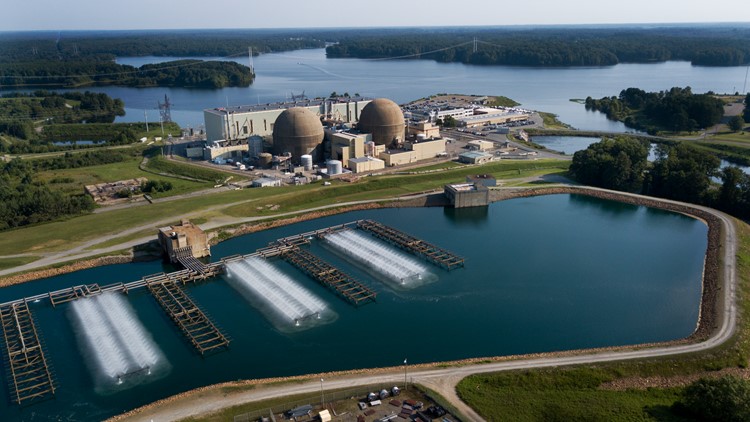RICHMOND, Va. — Renewables alone aren't expected to meet a projected increase in demand for electricity in the coming decades, Dominion Energy Virginia said in a filing this week that was closely aligned with Republican Gov. Glenn Youngkin's energy policy.
That means the state's largest electric utility may seek to keep most of its existing power stations online for decades to come and seek to build additional small natural gas and nuclear units, if it pursues the scenarios outlined in the planning document it filed Monday with state regulators.
“This ‘all of the above’ approach ensures we can reliably serve our customers ‘around-the-clock,’ especially on the hottest and coldest days of the year,” Ed Baine, the utility's president, said in a news release. “Our plan balances the benefits of renewables with the reliability of ‘on-demand’ power so we can meet the growing needs of our customers.”
Dominion's filing was quickly met with criticism from environmental groups and other clean-energy advocates, who have long called for greater urgency in the company's shift to renewables in order to help address the threat of climate change. Various advocacy organizations called it irresponsible, a “corporate profit grab," and an attempt to get in the “governor's good graces.”
Dominion laid out the possible future generation scenarios in an integrated resource plan, or IRP, filed with the State Corporation Commission. It's a mandatory long-range planning document that describes how the regulated monopoly utility expects to generate power to comply with regulations and meet customer needs, but it is not an application to build any specific project.
In the IRP, Dominion said that while it is committed to providing increasingly clean power, meeting the standards of a renewable energy law passed in 2020 and heralded by Virginia Democrats as a signature accomplishment will require the company to build and buy additional capacity to meet demand.
It noted that PJM, the transmission organization that oversees the electric grid in more than a dozen states, predicted in its 2023 forecast an increase in peak and energy load growth over the next decade driven primarily by data centers.
Taking that and other factors into account, Dominion laid out five possible scenarios for meeting its customers' needs. All call for new solar, wind and energy storage development. All but one, a least-cost plan the company was required to model but said it doesn't consider a true “path forward,” include the development of small modular nuclear reactors. All call for new natural gas generation, and several scenarios would increase Dominion's carbon dioxide emissions over the longest range of the study period.
The utility's parent company, Richmond-based Dominion Energy, which operates in 16 states, announced in 2020 a goal of reaching net zero greenhouse gas emissions by 2050.
Dominion Energy Virginia, which serves about 2.7 million customers in Virginia and a small portion of North Carolina, faces a deadline even sooner to meet the standards of the 2020 law, the Virginia Clean Economy Act, which requires it to generate 100% of its electricity from carbon-free sources by the end of 2045. The law does allow Dominion to petition to keep carbon-emitting power producers online longer over reliability or security concerns.
Environmental advocates raised concerns ranging from the methodology behind Dominion's modeling to the cost of small modular nuclear reactors, which are a relatively new technology in the U.S. Others noted the parallels between the IRP and Youngkin's plan.
“This appears to be more of a political document. ... It’s not a plan that takes renewable energy, including the Clean Economy Act requirements, and climate change seriously," said Nate Benforado, an attorney with the Southern Environmental Law Center.
Youngkin, meanwhile, issued a statement shortly after the document became public praising the company's approach and saying that it validated his energy plan released in October 2022. That planning document called for reevaluating the Clean Economy Act, raised concerns about premature natural gas retirements and called for expanding nuclear generation.
"I applaud Dominion Energy for taking a serious look at the anticipated demand and providing commonsense pathways to proactively delay the retirement of critical baseload capacity in this IRP,” Youngkin said in a statement. “Our regulated utilities have the responsibility to ‘keep the lights on.’”
In separate filings Monday with the commission, Dominion submitted rate-related proposals stemming from bipartisan legislation approved earlier this year.
The legislation directed a structural billing change, the effective elimination of $350 million in stand-alone charges called riders, that the company says will result in a monthly savings of about $7 for the average residential customer.
Dominion is also seeking SCC approval to spread out fuel costs, a move that means customers will eventually pay more but will be cushioned from a sudden sharp increase the company has said is largely attributable to the war in Ukraine. That could provide up to $7 a month in savings beginning July 1, Dominion said.
A proposed increase being sought by Dominion to a stand-alone transmission charge — $2.67 for the typical customer — would partly offset those savings, according to the news release.



